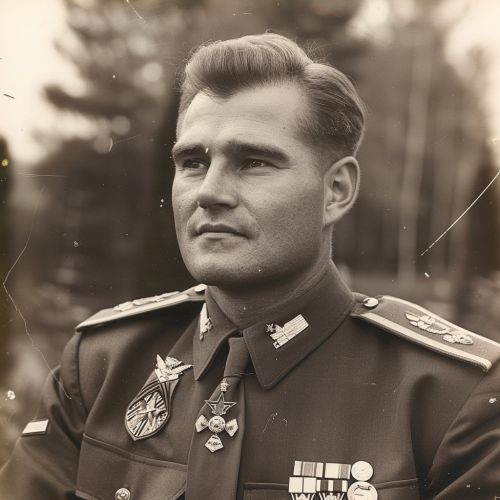Ivan Konev
Early Life
Ivan Stepanovich Konev was born on 28 December 1897 in the village of Lodeino, in the Vologda Governorate of the Russian Empire. He was the son of a peasant family and had a humble upbringing. His early life was marked by hard work in the fields and a lack of formal education.
Military Career
Konev joined the Imperial Russian Army in 1916 during the First World War. He was initially assigned to a reserve regiment but was later transferred to the front lines. His bravery and leadership skills were quickly recognized, and he was promoted to the rank of non-commissioned officer.


After the October Revolution in 1917, Konev joined the Red Army and fought in the Russian Civil War. He rose through the ranks and by the end of the war, he had become a regimental commander.
In the years following the civil war, Konev continued his military career in the Red Army. He attended the Frunze Military Academy and later the Soviet General Staff Academy, where he honed his military strategy and tactics.
During the Great Purge in the late 1930s, Konev managed to survive the political purges that decimated the Red Army's officer corps. His survival has been attributed to his loyalty to Joseph Stalin and his ability to navigate the treacherous political landscape of the time.
World War II
With the outbreak of World War II, Konev was appointed as the commander of the 19th Army. He led his troops in the defense of Moscow during the Battle of Moscow. His successful leadership during this critical battle earned him the promotion to the rank of General.
Konev went on to command the 2nd Ukrainian Front during the Battle of Kursk, one of the largest tank battles in history. His strategic planning and execution played a crucial role in the Soviet victory.
Towards the end of the war, Konev led the successful Prague Offensive, which resulted in the liberation of Czechoslovakia from Nazi occupation.
Post-War Career
After the war, Konev held several high-ranking positions in the Soviet military. He served as the Commander-in-Chief of the Soviet Ground Forces and later as the First Deputy Minister of Defense. He was also appointed as the Inspector General of the Ministry of Defense, a position he held until his retirement in 1962.
Death and Legacy
Konev died on 21 May 1973 in Moscow. He was buried with full military honors in the Kremlin Wall Necropolis.
Konev's legacy in the military history of the Soviet Union is significant. He is remembered as one of the most successful Soviet generals of World War II. His strategic planning and leadership played a crucial role in several key battles, contributing to the ultimate victory of the Soviet Union over Nazi Germany.
